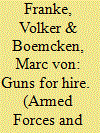| Srl | Item |
| 1 |
ID:
107669


|
|
|
|
|
| Publication |
2011.
|
| Summary/Abstract |
Whereas the values, attitudes, and motivations of soldiers serving in their countries' armed forces have been widely studied, to date we know very little about the motivations and occupational self-perceptions of individuals working for the private security industry. Using data obtained through an online survey, this article explores the values and attitudes of more than 200 private contractors with law enforcement backgrounds and operational experience providing armed security services in conflict regions. Contrary to media-dominating images of ruthless, money-grabbing mercenaries, respondents in our sample displayed attitudes comparable to those of military professionals, adhering to high levels of professionalism and ethical conduct and motivated largely by altruistic factors.
|
|
|
|
|
|
|
|
|
|
|
|
|
|
|
|
| 2 |
ID:
114931


|
|
|
|
|
| Publication |
2012.
|
| Summary/Abstract |
This paper investigates gendered patterns of corruption and access to illicit networks among female cross-border traders near the Senegambian border. Despite a discourse of generosity and solidarity, access to corrupt networks is mediated by class and gender, furthering social differentiation, especially insofar as it depends on geographic and socio-economic affinity with customs officers, state representatives and well-connected transporters. Issues of organisational culture, occupational identity and interpersonal negotiations of power represent important sources of corruption that require an understanding of the actual dynamics of public administration. While smuggling depends on contesting legal and social boundaries, the most successful traders (and transporters) strive to fulfil ideal gender roles as closely as possible. Ironically, trading on poverty and feminine vulnerability only works for relatively affluent women.
|
|
|
|
|
|
|
|
|
|
|
|
|
|
|
|